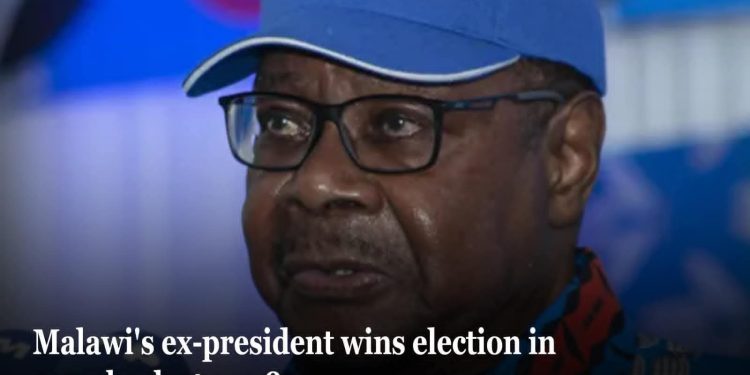By Hassan Osman Kargbo
Malawi’s former President Peter Mutharika has secured a dramatic return to power after being declared the winner of last week’s presidential election, in what observers are calling one of the most remarkable political comebacks in the country’s recent history.
The official results released by the Malawi Electoral Commission on Thursday show that the 85-year-old Mutharika won the polls with 57 percent of the vote, defeating incumbent President Lazarus Chakwera, who managed 33 percent.
Chakwera, 70, conceded defeat before the final tally was announced. He personally phoned Mutharika to congratulate him on what he described as a “historic win,” a gesture that was widely welcomed as a step toward ensuring a peaceful transition of power.
Mutharika, a former law professor who previously governed Malawi from 2014 to 2020, had been written off by many analysts after his loss to Chakwera five years ago. In that contest, Chakwera won by a wide margin, ending Mutharika’s first term in office. His return to the presidency now underscores both his resilience as a politician and the shifting dynamics of Malawi’s political landscape.
In his acceptance speech, Mutharika thanked the Malawian people for what he called a vote of confidence in his leadership and pledged to focus on unity and economic stability. “This victory is not mine alone; it is for every Malawian who believes in the promise of renewal and progress,” he said. “I stand committed to serving this nation with humility, experience, and determination.”
The election was closely watched across the region, with international observers praising the largely peaceful voting process. Turnout was reported to be high, reflecting strong public engagement in a contest that was seen as a critical test for Malawi’s young democracy.
Chakwera, a former pastor before entering politics, earned praise for his statesmanship in conceding early. In a brief statement, he urged his supporters to respect the outcome and support the country’s democratic process. “Leadership is about service, and the people have spoken,” Chakwera said. “I wish President Mutharika success as he takes on the responsibility of guiding Malawi forward.”
Mutharika faces significant challenges as he prepares to take office once again. Malawi continues to grapple with high unemployment, food insecurity, and the lingering economic effects of global shocks. Critics have also pointed to the need for strong anti-corruption measures, improved infrastructure, and investment in education and healthcare.
During his campaign, Mutharika promised to revive Malawi’s struggling economy through a mix of agricultural reforms, investment in energy, and measures to attract foreign investment. He also vowed to strengthen governance and fight corruption, themes that resonated with voters frustrated by persistent economic hardship.
Political analysts suggest that Mutharika’s comeback was aided by disillusionment with the pace of reform under Chakwera, whose government struggled to deliver on ambitious promises. Voter fatigue, combined with Mutharika’s reputation as an experienced statesman, appears to have tipped the scales in his favor.
With his decisive victory, Mutharika is set to begin his second stint in office with renewed authority. However, much will depend on his ability to deliver tangible improvements in the lives of ordinary Malawians.
As the country prepares for the transfer of power, Malawians are hopeful that this election marks the beginning of a new chapter—one defined by stability, growth, and national unity.













